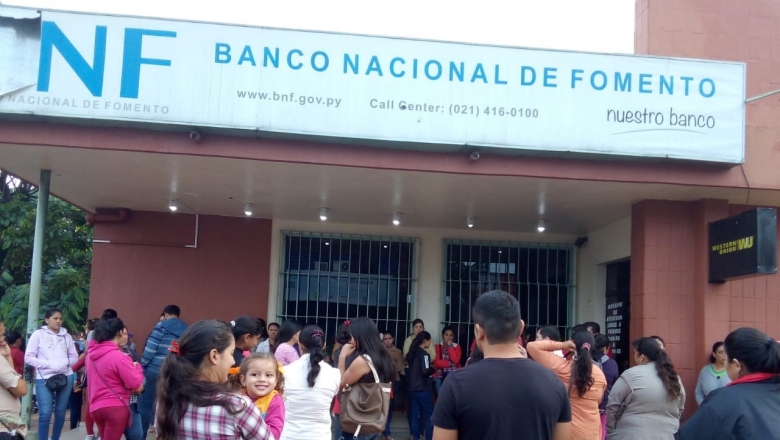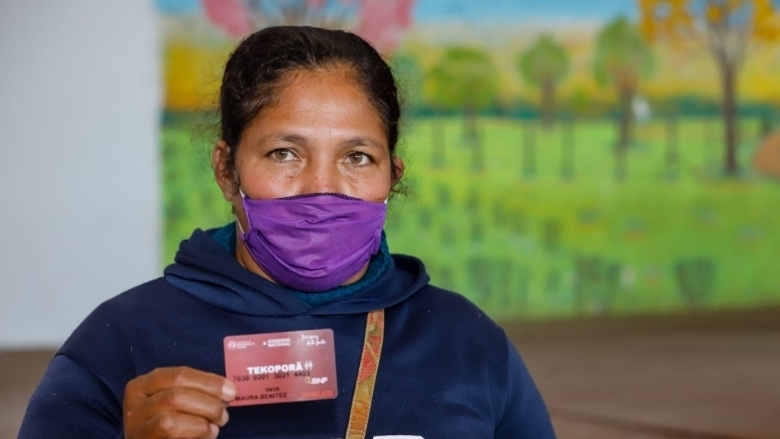Challenge
In 2010, the Paraguayan government published the report Paraguay para Todos y Todas: Propuesta para el Desarrollo Social 2010-2020, describing the critical role conditional cash transfers (CCTs) play in the nation’s social protection system and identifying fragmentation as an operational challenge of these programs. The government recognized the need to enhance coordination among the different participating ministries and to establish beneficiary feedback mechanisms to improve CCT efficiency.
Approach
In this context, in 2015 the government planned to scale-up the Ñañomoiru-Tekoporã Beneficiaries Empowered to Ensure Social Accountability program, which had been launched in 2005 to improve access to education and health services and enhance nutritional outcomes for extreme poor households. The Ñañomoiru project financed the development and implementation of two social audit tools — the Citizen Report Card and the Community Score Cards — to create new channels for civic engagement and to monitor program implementation at the local level by involving civil society organizations (CSOs) to facilitate feedback from beneficiaries and other stakeholders.
The project generated an opportunity and a framework to connect three sectors: organized civil society, government, and unorganized citizens. Mechanisms for participation, accountability, and exercise of the Citizen Law were embedded in the institutional culture of the Ministry of Social Development (MDS). A series of interinstitutional dialogues, informed by tailored technical assistance with the evidence-based tools, fostered complete government buy-in on the project’s added value and helped improve government services through beneficiaries’ feedback.
Active training on the use of social audit tools for recipient NGO staff at the Information and Resources Center for Development Community Foundation (Centro de Información y Recursos para el Desarrollo, CIRD) sped up the pace of implementing and accomplishing the project’s development objectives. The project’s original design established coherence among project objectives, components, and activities and provided adequate mechanisms for implementation, monitoring and evaluation, accounting, auditing, and risk management.

Results
From 2015 to 2019, the project achieved the following results:
- New social audit tools (Citizen Report Card and Community Score Card) were designed and implemented, creating a baseline for two-way collaboration and facilitating information exchange between public institutions and beneficiaries, thus making program execution more efficient, transparent, and socially responsible.
- The alliance between CSOs and the government was strengthened through Citizen Round Tables that became key spaces for information exchanges between municipal authorities, representatives from the ministries of education and health, CSOs, and representatives of participating families. This opened an active channel for beneficiary feedback and response from participating entities.
- Education, health, and nutritional outcomes improved for extreme poor households through beneficiaries’ deepened understanding of the program and of their role in facilitating their families’ access to health and education services. Beneficiaries learned to see themselves as key players in their own development.
- New dedicated channels were created for service provider institutions to find communal solutions based on beneficiary feedback and to settle on and communicate about agreed action plans, thus improving the program’s effectiveness and service delivery.
- The social audit tools developed by the project were also used in three Bank-financed operations in the water, transport, and rural development sectors to incorporate specific citizen engagement participation processes under the Open Government Action Plan 2016–2018. By providing technical assistance, the Bank enhanced engagement with the health and education sectors, becoming a reference for other NGOs and donors working on social accountability with the Paraguayan government.
Bank Group Contribution
The World Bank, through the Global Partnership for Social Accountability (GPSA), provided CIRD with a recipient-executed grant of US$600,000 to finance the Ñañomoiru Project under the Tekoporã Beneficiaries Empowered to Ensure Social Accountability Project. Costs associated with training and knowledge exchange activities and design and implementation of the core social audit tools (Citizen Report Card and Community Score Card) comprised two-thirds of the grant. All project disbursements were linked to results-based indicators, and project funds were fully disbursed by the closing date.
Partners
CIRD served as the implementing agency and grant executor. A coordinated working model enabled the collaborative participation of eight government institutions: Ministry of Social Development, Ministry of Education, Ministry of Health, Ministry of Finance, Technical Secretariat of Planning, Technical Unit of the Social Cabinet, Ministry of Child and Adolescence, and Ministry of Agriculture and Livestock, in addition to the Citizen Round Tables. Tekoporã district coordinators implemented programs at the local level, working with service providers and program beneficiaries. The WB task team supervised project implementation and supported CIRD through training and ad hoc technical assistance.
Beneficiaries
Besides the project’s direct beneficiaries — 88,000 extreme poor households — indirect beneficiaries included: (i) the Secretariat of Social Action, which benefited from information gained as it helped strengthen program management, deliver better results, increase support for program expansion, and provide sound information for budget allocation and negotiation; (ii) the Ministries of Education and Public Health, which benefited from better understanding the gaps in the program’s supply side, allowing them to better allocate budgets and improve policy decisions; and (iii) the Ministry of Finance and other government agencies now using the information obtained through the project to improve budget allocations and to monitor use of funds linked to Tekoporã.
Moving Forward
The sustainability of project outcomes will depend on whether the MDS incorporates the social audit tools as an integral element of the Tekoporã program. Local authorities’ level of commitment to using these tools and to generating spaces and opportunities for beneficiary feedback will be other key factors in whether project results are sustained. In addition, to ensure continuity and maintain confidence in the program, it will be important to disconnect Family Guides from changes in government administration.

